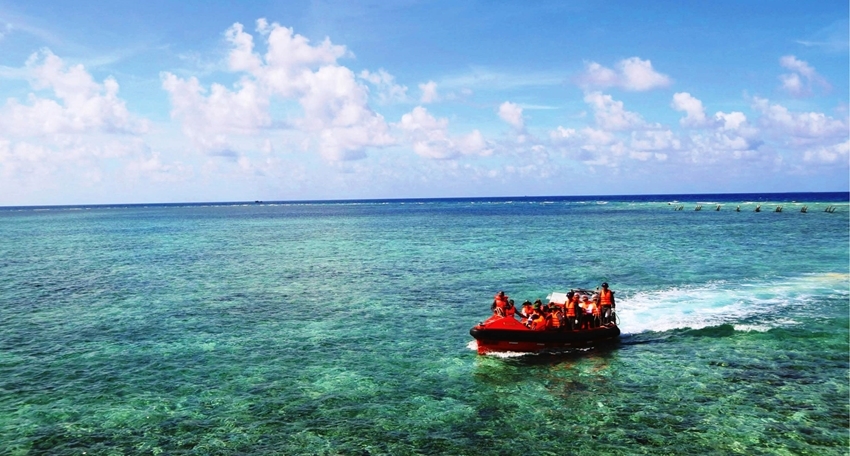 |
| The canoe transported the working group members to the island. Photo: Dang Khoa |
Before the Lunar New Year of Dragon 2024, I "received the order" to accompany the Naval Region 4’s working group (Cam Ranh City, Khanh Hoa Province) and nearly 100 newspaper and radio correspondents from all over the country on the visit to the officers, soldiers, and people living and performing tasks in the Spratly Archipelago.
Never have I been so overjoyed because in my heart, I have always had a special love for the Spratly. Being offered the chance to work on the sacred islands of the Fatherland is an honor and pride.
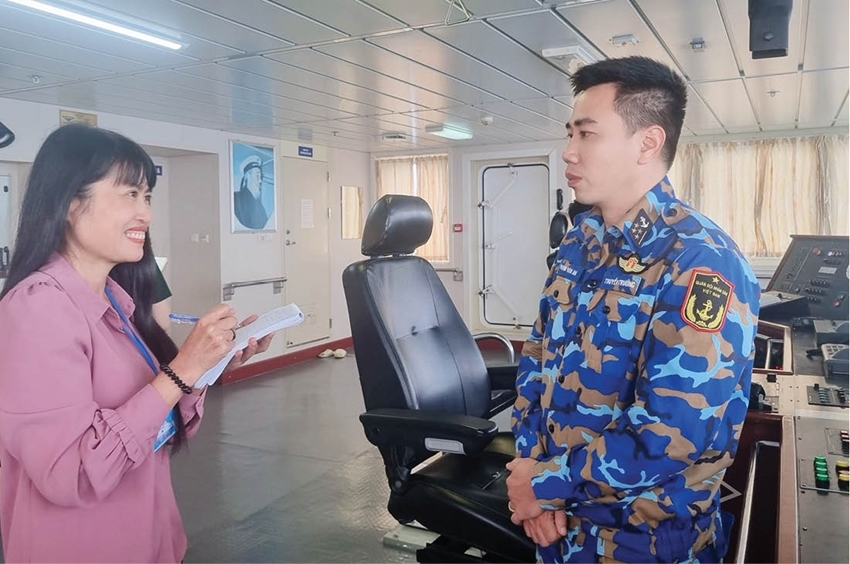 |
| The author interviewed the captain of Ship 561 (which took the working group and correspondents to the Spratly Archipelago) in the cockpit |
However, besides the joy, my heart was also "constantly" beset by worries over the "warnings": the far-off trip to the Spratly, huge waves and strong winds this season, and frequent unexpected storms. I was afraid of heavy seasickness and even mishaps. A few colleagues in Thua Thien Hue, some provinces and cities had accidents while working in natural disasters and could not return.
But journalism has chosen me, and I have devoted my love, passion, and dedication to the profession and will definitely not back down. After the decision to sign the contract for life insurance to partly take care of my daughter at home, in case of any unforeseen circumstances, I could securely carry my backpack and embark on a "lifetime" working trip for writers.
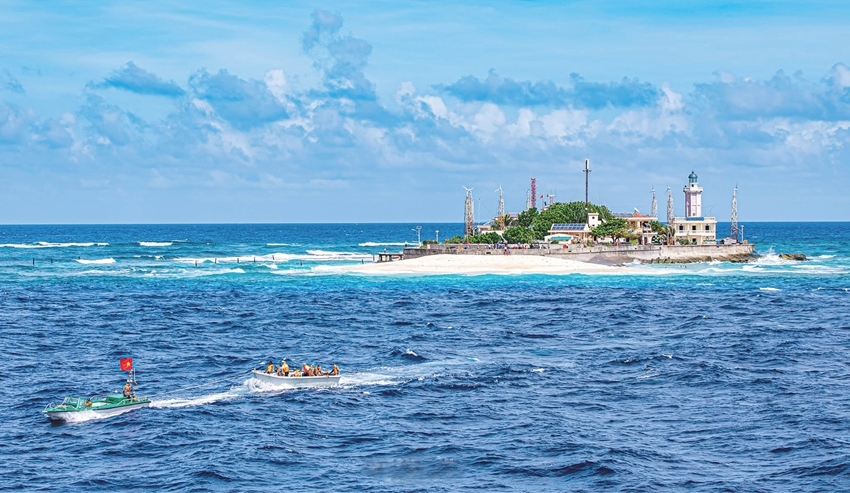 |
| An Bang Island has giant waves all year round, making it difficult and perilous to enter and exit the island |
After the solemn and emotional port greeting ceremony, the Naval Region 4’s Ship 561, carrying the working group, correspondents, officers, and soldiers who took on tasks in the Spratly Archipelago, sailed out to sea. Desiring to take advantage of every precious minute and second, I asked Colonel Le Dinh Hai, Deputy Brigade Commander of Brigade 146, the working group leader, for an interview. Mr. Hai said, "Now you should return to your room, lie still on the bed, and rest well.” The decisive voice caused the opposite person to "obey the order".
Not having given up, I went to the Spratly Island area ( the officers and soldiers reached the islands to receive tasks, arranged in each area according to different floors on the ship). While listening to the sharing from Lieutenant Colonel Tran Quang Phu, Commander of the Spratly Island, I felt dizzy, and my stomach churned with nausea. The officers and soldiers helped me back to room B8, where I stayed with four other female correspondents. After "rushing" into the bathroom to heave and "comforting" myself, I realized that the atmosphere in the room was "as quiet as a mouse" because all my colleagues were heavily seasick. Then I understood why the group leader resolutely advised me to return to my room and lie still on the bed.
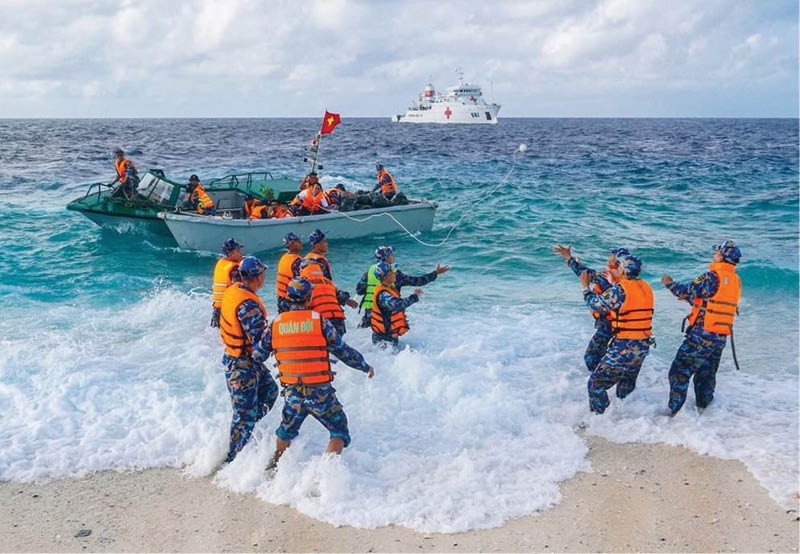 |
| Immersion in the waves to pull the canoe to the island |
But lying still was "not peaceful" with level 8-9 waves. The waves tossed the ship, causing the "disease" of seasickness not only to “afflict” the correspondents but also to "spread to” many officials and soldiers. From noon to afternoon, the meals in the dining room were deserted. The cooks had to cook porridge and bring it to the room.
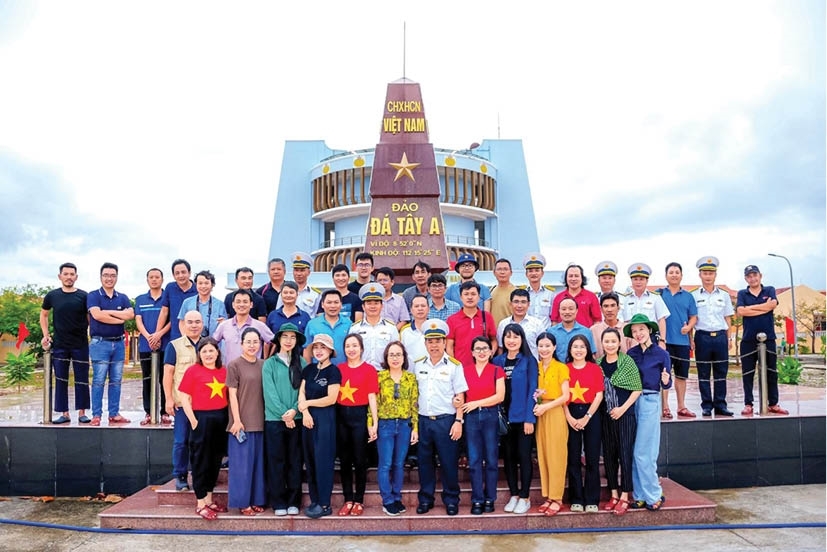 |
| The correspondents and Naval Region 4’s working group ahead of the sovereignty milestone of Da Tay A Island |
The seasick "died and came back to life", but every time they heard the ship's radio system announcing preparations to enter the island, all the correspondents came alive, smiled brightly, and jumped up quickly to prepare to set foot on the island. During the 18-day journey to the islands, only Spratly Island has a safe wharf for direct landing. For other islands, Ship 561 had to anchor at sea and launch canoes and small boats to transport people and Tet gifts.
Some islands have huge waves all year round. The weather at that time was unfavorable, and landing on the island was potentially dangerous. To ensure safety, the working group only arranged for 1/3 or 1/2 of the number of correspondents to step on the island (The time of high or low tide calculated for the canoes to exit and enter the island "smoothly" ).
Therefore, under the regulation, for difficult islands, any correspondent who has entered one island will stay on the ship for the next island. Having reached Da Dong C, felt all sad at the thought of my turn to "stay home", I widened my eyes when hearing the announcement on the loudspeaker system that I and my colleagues in room B8 could prepare to enter the island. Journalist Phuong Hoa smiled, "I meet the group leader privately, begging for permission for my whole room to get on the island."
So that was it. The female journalist once "died and came back to life" because of seasickness, and was also scared to the point of trembling in the face of the fierce waves covering the boat, but she "went in through the back door" to "beg" to get on the island, even though that meant continuation to face storms and dangers. Speechlessly moved, we looked at one another without saying a word, but everyone understood that they set foot on the islands standing tall on the sea, met the officers and soldiers who are resilient in the face of storms, day and night, preserve the sacred sovereignty of the sea and islands of the Fatherland.
I realized that when heavily seasick, my colleagues did not cry and even when the unexpected wind seemed to "swallow" the small canoe, they still did not cry. But during the flag-raising ceremony at the start of the year on Spratly Island, Song Tu Tay Island, Co Lin Island..., they shed tears when looking up at the National Flag that was flying proudly, imprinting the image of the country on the waves. Tears overflowed when we were "touching" the roar of waves mixed with the sacred soul, and when we were respectfully releasing the National Flag, fresh flowers, and paper cranes on the waves, ahead of the waters of Co Lin, Len Dao, Gac Ma, at the ceremony in commemoration of 64 Gac Ma heroic martyrs in the battle against invaders in 1988.
The naval soldier with a tanned face, holding a gun stood guard in the scorching sun on Da Dong B Island, with the assertion that on his shift "he cannot lay down his arms for a second". Although he only got a bandanna awarded by journalist Phi Hoang Le (VOV Electronic Newspaper), that thing also received many tears of love and admiration.
After a working trip to the Spratly Archipelago, journalist Phan Thi Trang Doan wrote: This is a journey full of smiles and tears. Smiles of joy and tears of great happiness, for realizing how beautiful and majestic our Fatherland is. What loyal and affectionate soldiers!
Ahead of the image of huge waves "surrounding" the small canoe that was taking the correspondents from the island back to the ship, Lieutenant Colonel Duong Chi Nguyen, Deputy Head of Politics, Brigade 146, Naval Region 4, burst into song: "I'm hearing the Fatherland calling my name/ With the wave sound of Paracel and Spratly/ Crashing against the rocks/ The Fatherland's voice echoes from the sea...", dispelling fear, rekindling a belief that when working in the Spratly, there are the times when no notebooks, pens, tape recorders, or cameras are needed because the "documents" are conveyed from heart to heart.
